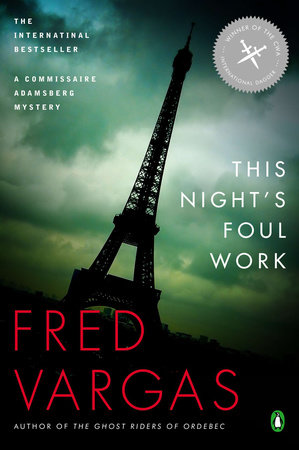This Night’s Foul Work Reader’s Guide
By Fred Vargas


INTRODUCTION
“O Earth, when I query, why disdain to reply?
And of this night’s foul work all knowledge now deny?
Has the key been withheld, or are my ears too weak
To hear of thy suff’ring, a sin too great to speak?”
—This Night’s Foul Work (p. 112)
Commissaire Jean-Baptiste Adamsberg is headed toward one of his toughest cases at the moment he is most in need of respite. He has only recently returned from a particularly dangerous assignment in Canada* and—on top of that—is still unsettled by the recent death of his father and his estrangement from Camille, the mother of his infant son. But Adamsberg is second-in-command of Paris’s Serious Crimes Squad. Peace is a luxury he can seldom afford, especially when a double murder and a shade from his own past threaten to turn his eccentric but devoted squad upside down.
The case should be open and shut: two small-time crooks are found with their throats slashed—and needle marks in their arms—in the seedy Porte de la Chapelle neighborhood. The narcotics division is eager to claim both victims but Adamsberg is certain the crimes are not drug-related. Fortunately, eminent pathologist Dr. Ariane Lagarde shares Adamsberg’s opinion. A renowned expert in criminal psychology as well as a former colleague, she determines that the killer is a woman and the needle marks a red herring, buying Adamsberg twenty-four hours to bring in solid evidence and back up his suspicions.
However, a prior commitment interferes with the case and so—as his squad pursues leads—Adamsberg drives 136 kilometers to babysit his son, Thomas, while Camille performs with a touring orchestra in the small Norman village of Haroncourt. During a brief stop in a local bar, Adamsberg becomes embroiled in a discussion surrounding the mysterious killing and evisceration of a locally renowned stag. He dismisses the incident but, upon his return to Paris, newly unearthed evidence sends him back to Haroncourt when the villagers there inform him of another deer killing.
The already tricky investigation is further complicated by the recent escape of a deranged female serial killer with a grudge against Adamsberg, and by the disconcerting presence of Lieutenant Louis Veyrenc de Bilhc, the unit’s new recruit. Diffident yet charismatic and handsome with distinctive brown hair streaked with red, Veyrenc has very personal motives for transferring to Serious Crimes—and Adamsberg is at the heart of them. Veyrenc speaks largely in verse but it is his silent reproach that heightens tensions as the team leaps to defend their commissaire in a feud whose history they know nothing about.
Literally chasing after shadows, Adamsberg connects the double murder to first one “accidental” death and then an ever-growing web of enigmatic crimes and corpses. But just as he begins to comprehend the killer’s bizarre and sinister motives, Adamsberg finds one of his own staff has gone missing and that he himself may be targeted for death.
The second of Fred Vargas’s internationally acclaimed novels to be published in the United States by Penguin, This Night’s Foul Work is an elegant tale whose horrors deepen with every page, while Commissaire Adamsberg is a delightfully idiosyncratic detective who is quickly winning over fans of intelligent and compulsively readable literary mysteries.
*Read Wash This Blood Clean from My Hands for details
Fred Vargas is the pseudonym of French historian, archaeologist, and writer Frédérique Audoin-Rouzeau. She worked at the French National Scientific Research Centre and later at the Institut Pasteur specializing in epidemiology of the Black Death and bubonic plague. She has written eleven novels, five of which have been translated into English.
Just for joining you’ll get personalized recommendations on your dashboard daily and features only for members.
Find Out More Join Now Sign In